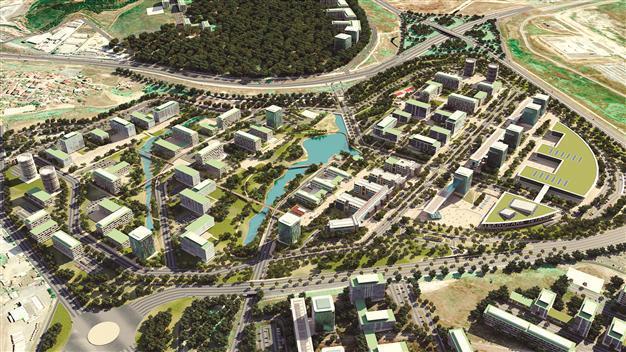Istanbul’s techno-park to make $10 bln annually
ANKARA - Hürriyet Daily News

The artist’s vision of istanbul Teknopark is completed and the construction work still continues there. Officials say this will be one of Europe’s largest technology parks. Company image
Teknopark Istanbul, a defense and related-industry research and development hub, will generate nearly $10 billion for Turkey’s economy annually after its completion in eight to 10 years, the project’s business development chief has said.“I think the annual contribution of Istanbul Teknopark to Turkey’s economy will be around $10 billion when the project is completed,” Özgur Özçelik, the program’s business development director, told the Hürriyet Daily News over the weekend.
Teknopark Istanbul will operate a 750,000-square meter indoor space at Sabiha Gokçen Airport, east of Istanbul, accommodating more than 30,000 personnel and targeting $10 billion in defense and non-defense business annually, to become one of Europe’s largest technology parks, similar to Silicon Valley.
Its major shareholders are the Undersecretariat for Defense Industries (SSM), with a 45 percent stake, and the Istanbul Chamber of Commerce (İTO), with a 40 percent stake. Construction work began late last year, when Science, Industry and Technology Minister Nihat Ergün and SSM chief Murad Bayar laid its foundation.
Talks with global giants
“The site will bring together companies and many universities in Istanbul, targeting strategic fields like aviation, maritime, electronics, information technology, nanotechnology, energy and automotive, biotechnologies, automation systems and robot technologies,” said Turgut Şenol, the CEO of the technology center. Some of the world’s technology giants are already in talks with Teknopark Istanbul to build their own offices there, he said.
The center’s first six blocks, with an indoor space of 61,000 square meters will be opened by Prime Minister Recep Tayyip Erdoğan in December or January, said the center’s officials. This will formally launch the technopark’s opening, which will expand into 950,000 square meters of indoor space.
Similar technoparks in Europe, for example the Hamburg Technopark in Germany, generate around $10 billion for the industry a year.
“The site will offer its residents tax advantages and logistical benefits, as they will be located within a major airport and have quick access to a trans-European motorway,” Şenol said. “Here, we will be hosting both Turkish and foreign techno ventures.”
$4 bln investment
In recent years, Turkish companies have won subcontracts from multinational programs, including the F-35 Joint Strike Fighter, attack helicopters and naval vessels, as well as contracts for vehicles, electronics and software for Turkey’s military. “Foreign contractors surely will benefit from Teknopark Istanbul, as international production programs involving Turkey are on a visible rise,” he said.
The partners SSM and İTO have earmarked a budget of $4 billion for the project, including the construction. South Korean Samsung and Korean Aerospace Industries, German Atlas, U.S. General Electric, French and Turkish Thales and Turkish Roketsan, STM and Milsoft are among the companies that are negotiating with Istanbul Teknopark over the allocation of lands and offices.
An international five-star hotel will also be included within Istanbul Teknopark’s boundaries.
“This will be among the biggest techno parks in the world. Being located inside an international airport and closeness to major land and sea transport routes also means they will greatly contribute to its success,” said Özçelik, the business development chief Şenol, a former SSM department head, chaired defense companies Ayesas and Meteksan Savunma. Before that, he was a business development chief at military electronics company Havelsan, one of Turkey’s top three defense companies.
The government in recent years has encouraged the indigenous design, development and production of the weapons it requires. It also has encouraged joint development and coproduction with foreign companies. Until the mid-2000s, Ankara often bought weapons off the shelf.
















